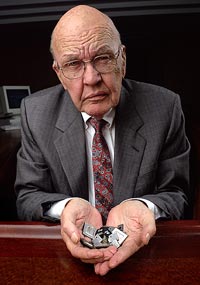Jack Kilby
| Jack Kilby | |
|---|---|
 |
|
| Born |
November 8, 1923 Jefferson City, Missouri, U.S. |
| Died | June 20, 2005 (aged 81) Dallas, Texas, U.S. |
| Nationality | United States |
| Fields | Physics, electrical engineering |
| Institutions | Texas Instruments |
| Alma mater |
University of Illinois at Urbana–Champaign University of Wisconsin–Madison |
| Notable awards |
Nobel Prize in Physics (2000) National Medal of Science (1969) IEEE Medal of Honor (1986) Charles Stark Draper Prize (1989) Computer Pioneer Award (1993) Kyoto Prize (1993) Harold Pender Award (2000) |
University of Illinois at Urbana–Champaign
Jack St. Clair Kilby (November 8, 1923 – June 20, 2005) was an American electrical engineer who took part (along with Robert Noyce) in the realization of the first integrated circuit while working at Texas Instruments (TI) in 1958. He was awarded the Nobel Prize in physics on December 10, 2000. To congratulate him, US President Bill Clinton wrote, "You can take pride in the knowledge that your work will help to improve lives for generations to come."
He is also the inventor of the handheld calculator and the thermal printer, for which he has patents. He also has patents for seven other inventions.
Born in Jefferson City, Missouri, Jack Kilby grew up and attended school in Great Bend, Kansas, graduating from Great Bend High School. (Road signs at the entrances to the town commemorate his time there, and the Commons Area at Great Bend High School has been named The Jack Kilby Commons Area.)
Kilby received his bachelor of science degree from the University of Illinois at Urbana-Champaign, where he was an honorary member of Acacia Fraternity. In 1947, he received a degree in electrical engineering. He obtained his master of science in electrical engineering from the University of Wisconsin-Madison in 1950, while working at Centralab, a division of Globe-Union corporation in Milwaukee.
...
Wikipedia
